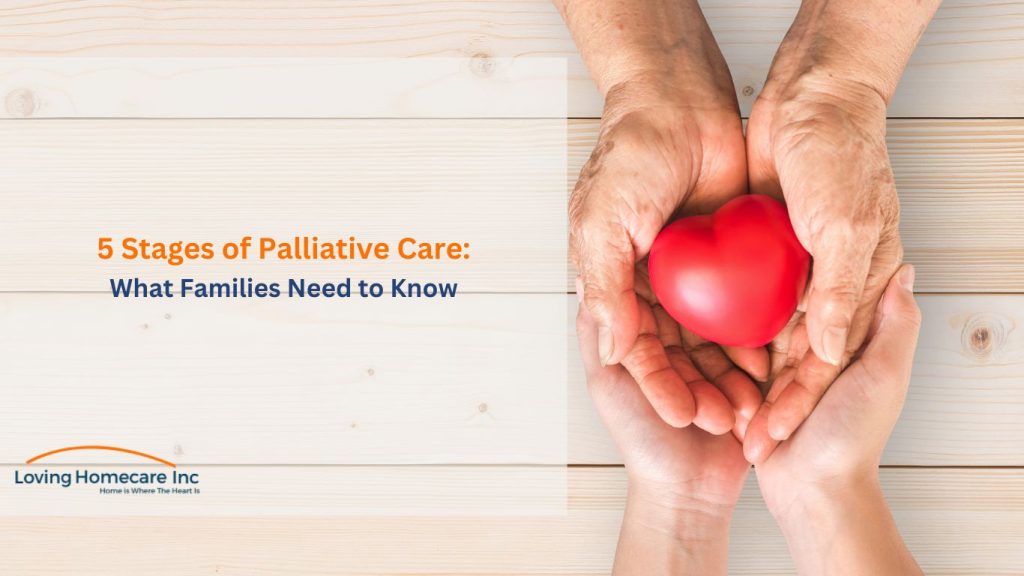Recently updated on April 22nd, 2025 at 10:46 am
Living with a serious illness is tough as it affects every part of your life. The symptoms can make everyday tasks harder, and the emotional weight can be just as exhausting. You may find yourself struggling not just physically but mentally as well, as your condition changes the way you live.
An illness like this can also take a toll on your relationships. You might not have the energy to do the things you love, and your loved ones may feel helpless watching you go through it. Family members often step in to help, but it’s not always easy for them either.
The good news is that there is help available. Palliative care is a type of support designed for people facing serious health conditions. It focuses on comfort, symptom management, and improving quality of life, not just for the person who is ill but for their family as well.
In this guide, we’ll break down what palliative care is, who can receive it, and the 5 stages of palliative care involved. More importantly, we’ll explore how it can bring relief and support when you need it most.
30 Seconds Summary
- Palliative care is special medical care for people with serious illnesses. It helps reduce pain, manage symptoms, and provide emotional and spiritual support. This care is for both patients and their families and can be given at home, in hospitals, nursing homes, or hospices.
- Palliative care has five stages, including planning care, managing symptoms, disease progression, end-of-life care, and bereavement support.
- Palliative care is not only for the patient. It also helps families by providing emotional support and counseling and helping with legal and financial matters. After the patient passes, families can also get support to deal with their loss.
What is Palliative Care?
Palliative care is a type of specialized medical care that is designed for individuals with serious illnesses. The goal of this care is to improve the quality of life by managing symptoms, providing emotional support, and helping families make difficult decisions.
Palliative care helps people with serious illnesses like cancer, heart disease, or Alzheimer’s. It is not the same as end-of-life care, which is for people in the last stage of their illness.
This care can last for months or even years. The goal is to manage symptoms and make life as comfortable as possible. A team of doctors, nurses, and caregivers provide medical and emotional support. They also help families cope with the stress of the illness.
Anyone with a serious illness can get palliative care. Many people think it is only for the end of life, but that is not true. Palliative care helps people feel better at any stage of their illness. End-of-life care, on the other hand, provides comfort in the final days or months.
Where Can You Receive Palliative Care?
So, where can you receive palliative care? It can be received at:
- Hospitals: Many hospitals have palliative care teams.
- At Home: Receiving palliative care at home gives individuals a chance to remain in a familiar and comfortable environment among their loved ones.
- Hospices: These are facilities that are specifically designed for compassionate, end-of-life care.
- Nursing Homes: Nursing homes provide round-the-clock support for those who need advanced care.
Get expert palliative care services with Loving Homecare.
Who can Receive Palliative Care?
According to the World Health Organization (WHO), you can receive palliative care if you have any of these of the following diseases; it can relieve a wide range of symptoms.
- Heart problems
- Different types of cancer
- Chronic respiratory illnesses
- AIDS
- Diabetes
- Chronic kidney and liver disease
- Multiple sclerosis
- Rheumatoid arthritis
- Chronic congenital disabilities
- Neurological disorders, such as dementia and Parkinson’s disease
5 Stages of Palliative Care
Palliative care is often divided into five stages. Knowing the palliative care stages can help you plan your care and make sure that you and your family receive the right support when you need it.
Stage 1: Create a Plan
The first step in palliative care is to create a personalized care plan. This plan helps you and your healthcare team understand your medical, emotional, and spiritual needs. It also makes sure that you get the right care and support at every stage of your illness.
What to Expect in This Stage?
At this stage, you will meet with your palliative care team. They will ask about your symptoms, current treatments, and how your illness affects your daily life. Your family and loved ones can also be part of this discussion. The goal here is to create a care plan that makes you as comfortable as possible.
Topics you may discuss:
- Your symptoms and how to manage them
- Medications and treatments you are currently using
- How your illness is affecting your everyday life
- How your family is involved in your care
- The expected progression of your illness
- Your preferences for where you want to receive care
Choose Your Palliative Care Location
One of the most important decisions is where you want to receive care. Your doctor will discuss options like getting palliative care at home or in a hospital, hospice, or care facility. They will also help you find ways to ease pain and manage symptoms. Your palliative care team will work closely with your primary doctor to make sure you get the best possible care.
For palliative care services, visit Loving Homecare.
Decide on Advance Directives
It is also a good time to start thinking about legal decisions for your future care. Advance directives are legal documents that state your medical preferences in case you are unable to make decisions later. These documents help make sure that your wishes are followed.
Discuss Power of Attorney
You may also choose someone to make medical decisions for you if you cannot. This is called healthcare power of attorney. It allows you to choose a trusted family member or friend who will make important healthcare choices on your behalf.
These can be difficult topics to discuss, and you do not have to decide everything right away. Take your time, ask questions, and make choices that feel right for you.
By creating a clear care plan, you can feel more prepared and in control of your journey. Your palliative care team will guide you every step of the way. If you or someone you know needs specialized care, visit Loving Homecare.
Stage 2: Active Monitoring and Symptom Management
Once your palliative care plan is in place, the next step is putting it into action. AT this stage your caregiver will manage your symptoms while making sure you stay as comfortable as possible. Your palliative care team will carefully monitor your health and adjust treatments as needed.
What to Expect in This Stage?
You will work with doctors, nurses, and caregivers who will manage your care and keep track of how your illness is progressing. They will also help you deal with the side effects of any medication or treatment.
Your care team may suggest referrals to specialists, such as:
- Pain management experts to help control discomfort
- Psychologists or counselors for emotional support
- Integrative medicine specialists who use holistic treatments
In addition to medical care, you may also learn techniques to improve your well-being, such as:
- Meditation and breathing exercises to reduce stress
- Massage therapy and healing touch for relaxation
- Visualization techniques to promote positive thinking
- Nutrition and exercise guidance to help with energy levels
If you need professional symptom management, visit Loving Homecare.
Stage 3: Disease Progression
As your illness progresses, your palliative care team will closely monitor your condition and make necessary changes to your treatment. Your palliative team will work to manage your symptoms, keep you comfortable, and provide emotional support as things change.
Adjusting Your Treatment Plan
If your disease worsens, your doctors may need to:
- Change your medications to better manage pain or other symptoms
- Adjust medication dosages to improve their effectiveness
- Introduce new treatments to address your current needs
If you need expert care as your illness progresses, visit Loving Homecare.
Discussing End-of-Life Care
This is also the stage when you need to discuss and prepare emotionally for what may come. Talking about end-of-life care can be difficult, but planning ahead can help you and your loved ones feel more prepared. Your care team will support you in making these decisions at your own pace.
Some topics you might discuss include:
- What to expect when treatments stop working
- Where you want to receive care (at home, in a hospice, or hospital)
- Your personal wishes for end-of-life support
For end-of-life care at home, visit Loving Homecare.
Emotional and Spiritual Support
This stage can bring many emotions, such as fear, sadness, and uncertainty. Counseling and emotional support can help you process these feelings.
Here is how a counselor or therapist can help:
- Provide a safe space to talk about your emotions
- Help you cope with fear, grief, and uncertainty
- Offer support in preparing for the transition ahead
Stage 4: End-of-Life Care
One of the stages of palliative care is End-of-life care; it is provided when the disease reaches its final stage and treatments are no longer effective. This stage provides comfort, dignity, and emotional support for both the patient and their loved ones.
End-of-life care can be provided:
- At home, with the support of family and professional caregivers
- In a hospice facility where round-the-clock care is available
- In a hospital, if advanced medical support is required
The goal is to relieve pain and discomfort, making sure the patient’s remaining time is as peaceful as possible.
What to Expect in End-of-Life Care?
At this stage, physical, emotional, and spiritual care becomes the main focus.
- Pain management and symptom relief
- Emotional and spiritual support
- Assistance with legal and funeral arrangements
- Transitioning to hospice care if needed
For dignified and compassionate end-of-life care at home, visit Loving Homecare.
Stage 5: Bereavement Support for Families
After the passing of your loved one, you might experience grief and loss. The bereavement stage makes sure that you receive the emotional and practical support you need to begin healing.
What to Expect in Bereavement Support
- Grief counseling and therapy
- Help with funeral arrangements
- Emotional support groups for family members
- Help dealing with legal and financial matters
What Is Included in Palliative Care?

With palliative care, you can receive:
- Medical treatment to manage pain and symptoms
- Emotional and mental health support
- Help with legal and financial planning
- Guidance for your family on caregiving and emotional well-being
What to Expect from Palliative Care
A serious illness can be physically and emotionally overwhelming. Palliative care helps ease pain, reduce stress, and improve comfort.
Your care team will explain each step of the process and adjust the plan based on your needs. Their goal is to make sure you feel supported and well cared for at all times.
Over to You
Dealing with the stages of palliative care can be challenging, but with the right support, you and your loved ones can experience comfort, dignity, and peace throughout the journey.
Get personalized and compassionate palliative care services with Loving Homecare.



